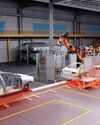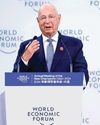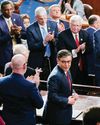
"Not very hard, is it? News service says one thing. Website says another. Society starts to fray. All we can turn to are the people we care about. But what if those people weren't who we thought they were?" So far, so chillingly authentic to this era of information bubbles and conspiracy thinking. But then Agent Prescod (Richard Dormer) continues: "What if they weren't even human?"
It turns out he's talking about Skrulls: reptilian space aliens who hide behind human faces on earth. According to his theory, a series of international terrorist attacks, each claimed by a different group of militants, are really all part of the Skrulls' plot to overthrow humanity. It's a shrewd setup, familiar enough to resonate in the real, chaotic world of 2023 but vague enough to be universally palatable. Depending on your perspective, the Skrulls could be the lizard people of proto-QAnon conspiracy theories or Russian intelligence operatives undermining democracy.
This slippery approach to political subtext is nothing new for Disney-owned Marvel, which is constantly recalibrating its family-friendly superheroes for a time when extreme partisanism can render even the most anodyne entertainment controversial-and when Hollywood products must satisfy the conflicting mores of the many nations that import them. What's notable about Secret Invasion, styled as a Cold War spy thriller but abstracted from the ideological conflicts of the real Cold War, is how common its particular form of evasiveness has become among TV's most popular thrillers. Shows set within the crucible of politics suddenly seem allergic to political ideas of all kinds.
This story is from the {{IssueName}} edition of {{MagazineName}}.
Start your 7-day Magzter GOLD free trial to access thousands of curated premium stories, and 9,000+ magazines and newspapers.
Already a subscriber ? Sign In
This story is from the {{IssueName}} edition of {{MagazineName}}.
Start your 7-day Magzter GOLD free trial to access thousands of curated premium stories, and 9,000+ magazines and newspapers.
Already a subscriber? Sign In

Q & A: Borge Brende
The World Economic Forum president talks with TIME editor Sam Jacobs

Q & A - Rene Haas
Arm's CEO on how his hardware is supporting the Fourth Industrial Revolution

The conflicts looming over 2025
WHEN DONALD TRUMP TOOK THE OATH OF OFFICE AS President in January 2017, his first foreign policy priority was to get tough on China. The Trump 2.0 Administration will continue that work. But when he strides back into the Oval Office in January 2025, Trump will also become responsible for U.S. management of two dangerous wars, the kinds of hot foreign policy crises he was fortunate to avoid during his first term.

Rev Lebaredian
Nvidia's vice president of Omniverse and simulation technology on training AI-powered robots

5 predictions for AI in 2025
New uses and policy questions come into focus

Roy Wood Jr. The comedian on his new stand-up special, the importance of working in food service, and learning from Keanu Reeves
8 QUESTIONS WITH Roy Wood Jr.

A call for global cooperation in the Intelligent Age
Cultivate wisdom along with innovation

The D.C. Brief
IN THE END, THE THREAT OF A FARright revolt proved more menacing than most imagined, as Republican Mike Johnson initially came up short on Jan. 3 during the first balloting to keep him as Speaker.

The digital labor revolution
OVER THE PAST TWO YEARS, WE'VE WITNESSED advances in AI that have captured our imaginations with unprecedented capabilities in language and ingenuity. And yet, as impressive as these developments have been, they're only the opening act. We are now entering a new era of autonomous AI agents that take action on their own and augment the work of humans. This isn't just an evolution of technology. It's a revolution that will fundamentally redefine how humans work, live, and connect with one another from this point forward.

Tech we can trust
Serving humanity's best interests must be at the center of progress